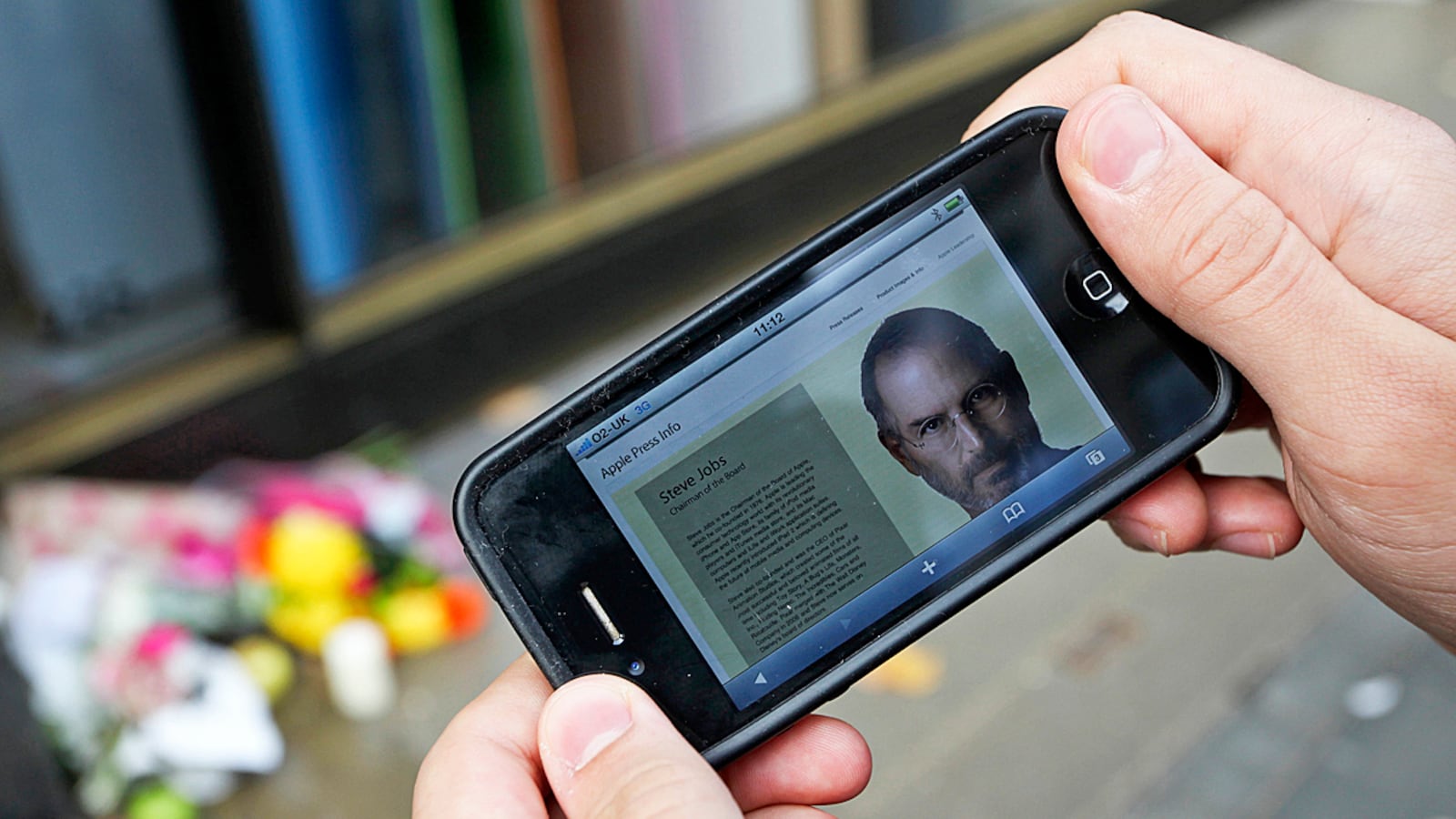Steve Jobs, 1955–2011 Steven Levy, Wired
Steven Levy draws on his years of covering Apple for his tribute to Steve Jobs. He depicts Jobs as both a wildly ambitious businessman and a starry-eyed idealist. Jobs told Levy once that he wanted to create “a $10 billion company that didn’t lose its soul.” From the beginning, says Levy, Jobs had a “freakish chutzpah,” kicking aside hoops everyone else had to jump through, and almost always getting his way. The tribute also has some intriguing details about Jobs’s philosophy. “I’m a big believer in boredom,” he said. Boredom allows you to indulge curiosity, and “out of curiosity comes everything.” “All the [technology] stuff is wonderful, but having nothing to do can be wonderful, too.”
The Steve Jobs I Knew Walt Mossberg, All Things D
At the fifth D technology conference, Walter Mossberg managed to arrange a talk between Jobs and his archrival, Bill Gates. But the interview was almost scrapped when Mossberg asked Jobs in an earlier interview what it was like being a major Windows developer, since iTunes was installed on millions of Windows PCs. Jobs answered that it was like “giving a glass of ice water to someone in Hell.” Gates was not pleased.
When the two met before the interview, Gates greeted Jobs by saying, “So I guess I’m the representative from Hell.” Jobs handed Gates a cold bottle of water. “The tension was broken, and the interview was a triumph, with both men acting like statesmen,” says Mossberg. “When it was over, the audience rose in a standing ovation, some of them in tears.”
8 Questions About Life After Jobs Ken Auletta, The New Yorker
Steve Jobs was a consummate elitist, yet he was loved by many who decry elitism everywhere else. “The reason is that they felt that his elitism was meant to make better products for them,” writes Ken Auletta, “that his perfectionism, his high standards, were not to make money—though he did and he charged higher prices than his competitors—but to help them.” Jobs defied the categories of businessman and engineer; Auletta calls him a bridge. “Engineers are brilliant—they have all sorts of ideas. But without someone like Jobs to translate their work, they could never cross that divide.”
My Regrets on Burning Steve Jobs Brian Lam, The Atlantic
There was a time when Jobs was a fan of the gadget blog Gizmodo. Brian Lam, the former editor of the site, recalls running into Jobs at All Things D in 2007, and Jobs telling him that he read the site three or four times a day, and later offering feedback on the site’s redesign.
But then the iPhone 4 found its way into the hands of one of Lam’s reporters, and Lam got a call. "Hi, this is Steve. I really want my phone back.” Jobs was nice about it and asked Lam what he thought of the phone. “It’s beautiful,” said Lam. But when he refused to give it back without Jobs confirming the phone was his, things got tense.
Several months after the story broke, Lam wrote an apology to Jobs. “Now I've learned it's better to lose a job I don't believe in any more than to do it well and keep it just for that sake,” he wrote. Jobs never responded, but someone close to him said he had gotten over it. “I just feel lucky I had the chance to tell a kind man that I was sorry for being an asshole before it was too late,” writes Lam.

An Oral History Interview Daniel Morrow, Smithsonian Institution
Back in 1995, during Jobs’s exile from Apple, the Smithsonian conducted a lengthy interview with him, touching on everything from the future of technology to chasing butterflies as a child. Jobs dwells on his tough time in school. “I encountered authority of a different kind than I had ever encountered before, and I did not like it," he says. “They came close to really beating any curiosity out of me.” Jobs fought back with a campaign of pranks. He put firecrackers in teachers’ desks. “There was a big bike rack where everybody put their bikes, maybe a hundred bikes in this rack,” he says, “and we traded everybody our lock combinations for theirs on an individual basis and then went out one day and put everybody's lock on everybody else's bike and it took them until about ten o'clock that night to get all the bikes sorted out.” If it hadn’t been for his fourth-grade teacher, who took Jobs under her wing, he says he probably would have ended up in jail.
John Sculley on Steve Jobs Leander Kahney, Cult of Mac
Jobs famously wooed John Scully from Pepsi to be CEO of Apple by asking him whether he’d rather "sell sugar water for the rest of your life or come with me and change the world." But in 1985, Scully forced Jobs out. In this interview, Scully reflects on Jobs’s design philosophy and acknowledges that it was a mistake for him to become CEO instead of Jobs.
“What makes Steve’s methodology different from everyone else’s is that he always believed the most important decisions you make are not the things you do—but the things that you decide not to do,” says Scully, who recalls visiting Jobs’s house and finding it furnished with only a lamp, a chair, a bed, and a picture of Einstein. After Jobs left, Scully says, the company tried to hew to his design philosophy. “All the design ideas were clearly Steve’s,” says Scully. “The one who should really be given credit for all that stuff while I was there is really Steve.”
The Playboy Interview: Steven Jobs David Sheff, Playboy
After years of seeing Jobs in his black turtleneck and jeans, it’s strange seeing him in a bowtie and suspenders at the top of a 1985 Playboy profile. David Sheff describes the young Jobs as a man on a mission, “preaching the Gospel of salvation through the personal computer—preferably one manufactured by Apple.” He accompanies Jobs to a birthday party in New York, where he gives the 9-year-old birthday boy the present of a Macintosh. Andy Warhol and the graffiti artist Keith Haring quickly take over. “What is this? Look at this, Keith. This is incredible!” says Warhol. But after the celebrities leave, Jobs returns to teach the child how to use the computer. “Older people sit down and ask, 'What is it?' " says Jobs, "but the boy asks, 'What can I do with it?' "






